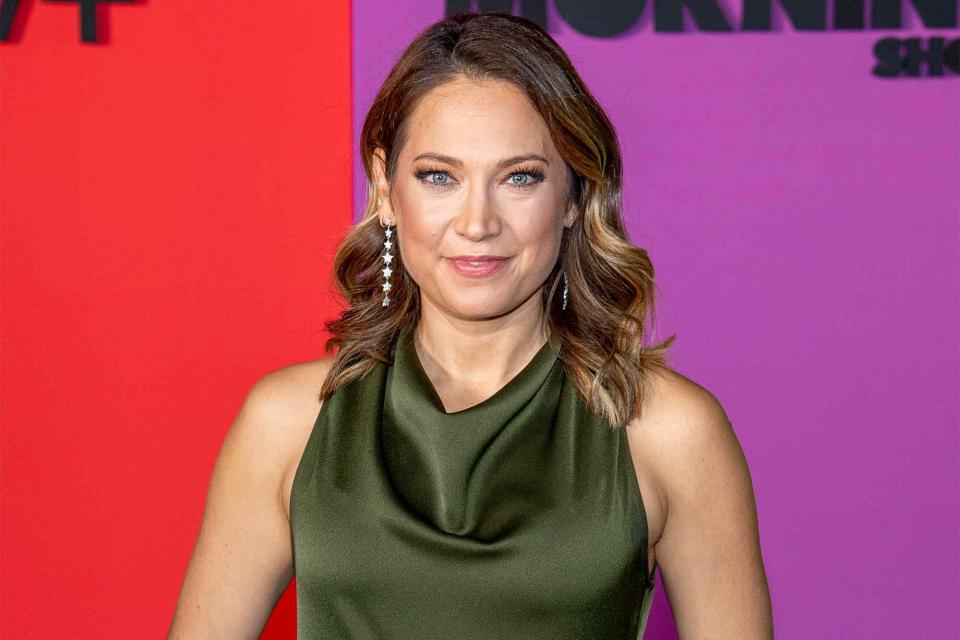Ginger Zee Recalls 'Scary' Inpatient Treatment for Depression: 'I Really Needed Help'
- Oops!Something went wrong.Please try again later.
- Oops!Something went wrong.Please try again later.
“We, as a society, need to treat [suicide] differently,” the "Good Morning America" chief meteorologist said, using her own experience to raise awareness about mental healthcare

Ginger Zee is detailing her “twisted” mental health struggles from the past and how getting help led her to a life of activism.
The Good Morning America chief meteorologist — who previously revealed that she was diagnosed with depression at 21 — appeared on the Quite Frankly podcast where she recalled the moment she realized her mental health was struggling so bad that she checked herself into a hospital to receive inpatient treatment.
“Ten days before everybody saw me take this dream job of national television, I checked myself into the Columbia psych ward,” she told host Frank Elaridi.
“At least we’re getting to a point where we can talk about it. I went to the hospital because I needed to go to the hospital. I needed help. I should’ve done it 10 years before,” she said, noting that a piece of her finally learned “just enough” about mental healthcare to want to “save” her own.
Never miss a story — sign up for PEOPLE's free daily newsletter to stay up-to-date on the best of what PEOPLE has to offer, from juicy celebrity news to compelling human interest stories.
Zee, 42, has been vocal about struggling with anorexia, an emotionally abusive relationship and her battle with depression, which led to her past suicide attempt. During the show, she said getting the help she needed allowed her to realize her “job” was to help others going through similar journeys.
“What the inpatient situation does for you, it’s not fun. It’s so scary,” she explained. “At first I was looking around like, ‘I don’t need to be here.’ But they assess you and they were not going to let me leave until I was not unsafe. I really needed help. They really deemed me unsafe, that’s how bad it was.”
“If you have suicidal thoughts, that is bad. And we need to look at it as such because there are ways and treatments and therapies that can make you not have those thoughts. I think that’s what I didn’t understand for a decade of my life,” she continued. “This is why it’s my responsibility to talk about this stuff because there’s so many people who don’t get this chance. We, as a society, need to treat [suicide] differently.”

In May, Zee spoke to PEOPLE about how after improving her mental health, she turned to running and fitness to maintain it.
"Once I went to the hospital to get my inpatient treatment — which I should have done much earlier — physical activity was part of the roadmap they gave me… after sleep and nutrition," she said at the time.
"I always knew that running felt good. I always knew that I felt a little better, more clear-headed. But that's when I realized the science behind what was actually happening when you move, and how that was an integral part and would be in the future," she added. "Running is the crown jewel of my physical mental connection."
Now that Zee is "the healthiest and happiest I've ever been" and running at least three times a week, she said she's turning her focus toward raising more awareness about mental health.
f you or someone you know is considering suicide, please contact the 988 Suicide and Crisis Lifeline by dialing 988, text "STRENGTH" to the Crisis Text Line at 741741 or go to 988lifeline.org.
If you or someone you know is battling an eating disorder, please contact the National Eating Disorders Association (NEDA) at 1-800-931-2237 or go to NationalEatingDisorders.org.
For more People news, make sure to sign up for our newsletter!
Read the original article on People.

